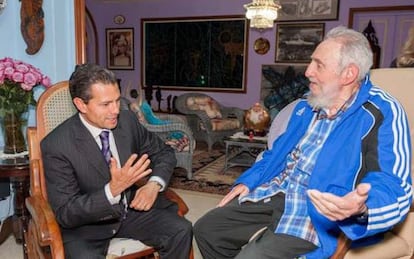Mexico and Cuba seal their reconciliation
The Mexican president said his country's investors want to "participate in the economic modernization of the island."


The heirs of the Mexican revolution and the father of the Cuban revolution rekindled the friendship between their two countries on Wednesday. Although the relationship has always been of historically import, there had been some discord in the past few years. A photograph immortalizes the event: Mexican President Enrique Peña Nieto chatting with the man who had been in charge of Cuba for seven years when he was born, Fidel Castro. The meeting took place behind the scenes at the Community of Latin American and Caribbean States (CELAC) Summit in Havana this week. Photo-ops aside, Peña Nieto's official visit, folded in between CELAC meetings, represents Mexico's attempt to get ahead in the race against other regional leaders, like Brazil, who are trying to capture the investment opportunities to come in the wake of economic reforms in Cuba.
The Mexican president's office blog published a post on Thursday with the title "A New Page in History," reflecting the significance of the encounter. Peña Nieto filled the next page with a meting with his counterpart, Raúl Castro, who shared with him plans for "the modernization of the economic and social models" in Cuba. Peña Nieto expressed interest on behalf of Mexican investors and invited Castro to the sixth summit of the Association of Caribbean States and to the 24th Ibero-American Summit this year in Mexico. These invitations reflect the diplomatic victories Cuba won over the course of the week as host of the conference. Most Latin American heads of states participated in the conference without ever stepping too hard on the human rights issues on the island.
Peña Nieto said his 50-minute meeting with Fidel Castro was "very moving." He found the former head of state "very lucid," and called him "the moral leader of Cuba." "As I conclude this official visit, I thank the people and government of Cuba for for their hospitality. It was a pleasure being in your country," Peña Nieto said in a farewell note on his Twitter page.
Mexico has been in conversation with the Castro regime since the Cuban Revolution and it is the only country that never broke diplomatic relations with the island. Still, the relationship began to veer off course in the 1990s. It derailed completely in 1999 when then Mexican President Ernesto Zedillo made a strong indictment of the human rights issues in Cuba at the Ibero-American Summit in Havana. Then Mexican Secretary of Foreign Affairs Rosario Green also held a meeting with dissidents.
During the presidency of Vicente Fox (2000-2006) dialogue broke down even more. Even though tensions eased during Felipe Calderón's tenure, the ice did not break until the Institutional Revolutionary Party returned to power last year. In October, Mexican Secretary of Foreign Affairs José Antonio Meade visited Havana and his counterpart Bruno Rodríguez traveled to Mexico City. As a result of these meetings Mexico cancelled 70 percent of Cuba's debt, or 340 million dollars. Mexico's Banco Nacional de Comercio Exterior said that the measure was not a gift. It erased the "capitalization of accrued moratorium interest." It was not in any way an act of grace. In a few months the Mexican Secretary of Economy, Ildefonso Guajardo, will lead a delegation of high level financial entities and businesses on an exploratory mission for investments on the island.
The meeting benefits both parties. Havana needs to expand its diplomatic relations since its main ally, Venezuela, is suffering from economic degradation. Mexico needs to get a head start in the race for hegemony in the region as it faces Brazilian power. This week Brazilian President Dilma Rousseff joined the fight as she inaugurated the large port in Mariel, Cuba, about 45 kilometers west of the capital. The Brazilian company Odebrecht invested 1,092 dollars in the Cuban project.
Mexico is Cuba's third most important commercial partner in the region after Venezuela and Brazil. According to government sources, Mexican currently invests 730 million dollars on the island. Trade between the two countries accounted for 280 million dollars between January and September 2013.
Translation: Dyane Jean François
Tu suscripción se está usando en otro dispositivo
¿Quieres añadir otro usuario a tu suscripción?
Si continúas leyendo en este dispositivo, no se podrá leer en el otro.
FlechaTu suscripción se está usando en otro dispositivo y solo puedes acceder a EL PAÍS desde un dispositivo a la vez.
Si quieres compartir tu cuenta, cambia tu suscripción a la modalidad Premium, así podrás añadir otro usuario. Cada uno accederá con su propia cuenta de email, lo que os permitirá personalizar vuestra experiencia en EL PAÍS.
¿Tienes una suscripción de empresa? Accede aquí para contratar más cuentas.
En el caso de no saber quién está usando tu cuenta, te recomendamos cambiar tu contraseña aquí.
Si decides continuar compartiendo tu cuenta, este mensaje se mostrará en tu dispositivo y en el de la otra persona que está usando tu cuenta de forma indefinida, afectando a tu experiencia de lectura. Puedes consultar aquí los términos y condiciones de la suscripción digital.








































